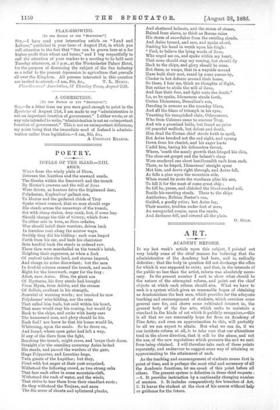POETRY.
IDYLLS OF THE ILIAD.—XIII.
ASIUS.
WHEN from the windy plain of Ilium, Between the Xanthns and the seaward sands, The Greeks within the fencework and the trench By Hector's prowess and the will of Zeus Were driven, as hunters drive the frightened deer, Polydamas, Eaphorbas' gallant son, To Hector and the gathered chiefs of Troy Spake wisest counsel, that no man should urge His steeds across the causeways of the trench, Set with sharp stakes, deep sunk, lest, if some hap Should change the tide of victory, which flows To either side in turn, as Zeus ordains, Woe should befall their warriors, driven back In formless rout along the narrow ways.
Swiftly they did his bidding : each man leaped Forth from his car, and bade his charioteer Rein heedful back the steeds in ordered row.
These then were marshalled on the trench's brink, Neighing their eagerness, as when a flock Of seafowl takes the land, and storms impend, And clangs its notes discordant ; but the men In fivefold column crossed the trench, and made Right for the fencework, eager for the fray : Afoot, save Asius. Him, the giant son Of Hyrtacus, his fiery steeds had brought From Mysia, from Arisbe, and the stream Of Sellois, exultant in his strength, Scornful of warning words ; nor brooked he now Polydamas' wise bidding, nor the cries That called him back, but said within his heart, That none would stay his coming, but would fly Back to the ships, and smite with hasty oars The homeward seas, and glory should be his.
Rash fool! nor knew he that his bones would lie, Whitening, upon the sands. So he drove on, And found, where open gates had left a way, If any of the fliers from the fight, Reaching the trench, might cross, and 'scape their doom.
Straight o'er the sounding causeway Asins lashed His steeds, and passed the warders of the gate, Huge Polypastas, and Leontins huge, Twin giants of the Lapithse; but they, Fired with hot anger at their post surprised, Withstood the following crowd, as two strong oaks That face each other in some mountain-cleft, Withstand the rush of water, and the winds, That strive to tear them from their steadfast roots; So they withstood the Trojans, and anon The din arose of shouts and splintered planks, And shattered helmets, and the storm of stones, Rained from above, as thick as Boreas rains His storm of snowflakes from the swirling clouds.
And Asius turned, and saw, and spake aloud, Smiting his hand in wrath upon his thigh : "Fool, to believe the lying words of Zeus, Who urged me on, and spake within my heart, That none should stay my coming, but should fly Back to the ships, and glory should be mine.
But these, as wasps, that in a wayside mound Have built their nest, vexed by some passer-by, Cluster in hot defence around their home, So these, I fear me, think no thoughts of flight, Bat rather to abide the will of Zeus, And face their foes, and fight unto the death."
Lo, as he spake, Idomenens strode forth, Cretan Idomeneus, Dencalion's son, Dazzling in armour as the noonday blaze, And all the blaze of triumph in his eyes, Vaunting his vanquished slain, Othryonens, Who from Cabesns came to succour Troy, And win a promised bride, but found no prize Of peaceful wedlock, but defeat and death.
Him dead the Cretan chief strode forth to spoil, But Asins brooked not the sad sight, and sprang Down from his chariot, and his eager haste Undid him, baring his defenceless throat, Where, 'neath the manly growth that fringed his chin, The close-set gorget and the helmet's clasp Were sundered one short handbreadth each from each.
There, as he leaped, Idomeneus' straight spear Met him, and drove right through, and Asins fell, As falls a pine upon the mountain side, When round its roots the woodman plies his axe, To fell it for the mast of some great ship ; So fell he, prone, and clutched the blood-soaked soil, Beside his snorting steeds. These to the ships Antilochus, Neleian Nestor's son, Guided, a goodly prize; but Asins lay, Their master, trodden under foot of men, An unregarded corpse, upon the sands, And darkness fell, and covered all the plain. 0. OGLE.


































 Previous page
Previous page